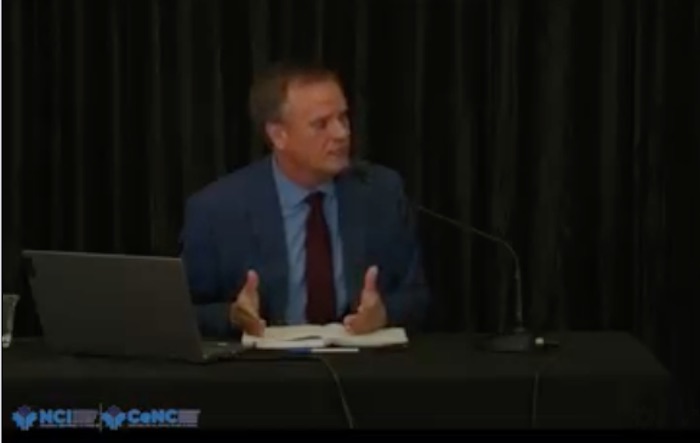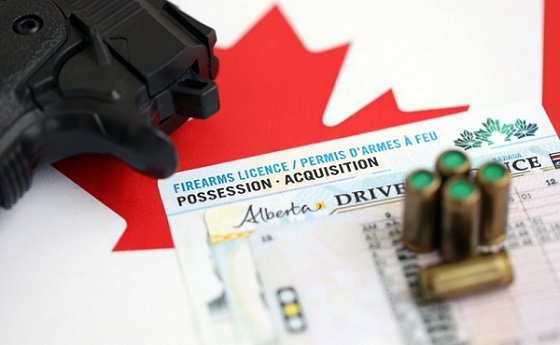COVID-19
“If you tell the truth consistently, trust is automatic” – Former CBC Reporter blasts media coverage during pandemic and Freedom Convoy

Article submitted by Adele Paul
Former CBC reporter testifies at National Citizen’s Inquiry in Toronto
At the National Citizens Inquiry in Toronto, former CBC reporter Rodney Palmer delivered testimony critical of Canada’s public broadcaster during the COVID-19 crisis. Palmer testified to a series of events that he called engaging in ‘propaganda’ and censorship rather than good faith ‘newsgathering’ at CBC.
The events included an April 4th, 2020, piece from Adrienne Arsenault entitled “How to talk to your family about COVID-19 misinformation” which offered suggestions on how to talk to family members who might falsely suggest the SARS-CoV-2 virus came from a lab. Palmer asserts that there was insufficient evidence at that time to make any definitive claims about the virus’ origin.
Other events of concern to Palmer were the steps taken by the CBC to promote ‘trust’ in journalism since 2021 which include joining international conglomerates including the Trusted News Initiative and the Trust Project, among others, which sought to control the spread of ‘misinformation’. This, according to Palmer, was an attempt to address a March 2021 survey which concluded that half of Canadians polled said they felt journalists intentionally try to mislead them. Palmer was critical of this approach stating, “If you tell the truth consistently, trust is automatic.”
In addition, Palmer testified that CBC actively engaged regularly in censorship. One such event happened in 2021. CBC Marketplace reported over 800 pieces of content to social media giants demanding that they be censored, many of which were subsequently taken down.
Another red flag for Palmer was the public broadcaster’s reporting on early treatment of COVID-19. In fall of 2021, CBC issued a series of stories which reported that ivermectin, a widely administered anti-parasitic drug cited by many medical professionals as a treatment for the disease, was primarily for use in livestock and warned that it could potentially kill or make humans seriously ill. Their reports, he said, failed to include that ivermectin was a nobel-prize winning and widely-used medication for humans and cited in extensive scientific literature as having a therapeutic benefit for COVID-19.
Palmer concluded with some of his own work covering the Freedom Convoy in which he interviewed a number of truck drivers, many of them people of colour, who denounced the notion that the movement was led by racists or white supremacists, a narrative espoused by Canadian politicians including Prime Minister Justin Trudeau and bolstered repeatedly by the CBC.
When asked what might be done to improve the prospects for Canadian media, Palmer was reserved. He said they might be forgiven for the exceptions they took early on in the emergency when they acted as a mouthpiece for Public Health when little was known about the virus, but finished by saying “the emergency is over, but the exception still exists.”
The National Citizens Inquiry, a citizen-led initiative aimed at giving voice to citizens regarding Canada’s response to COVID-19, kicked off its second round of testimonies in Toronto Thursday morning. The inquiry launched in Truro on March 16 and will facilitate 8 hearings across the country throughout the spring collecting testimonies from ordinary Canadians and expert witnesses.
From the National Citizens Inquiry Facebook page
COVID-19
Trump DOJ seeks to quash Pfizer whistleblower’s lawsuit over COVID shots

From LifeSiteNews
The Justice Department attorney did not mention the Trump FDA’s recent admission linking the COVID shots to at least 10 child deaths so far.
The Trump Department of Justice (DOJ) is attempting to dismiss a whistleblower case against Pfizer over its COVID-19 shots, even as the Trump Food & Drug Administration (FDA) is beginning to admit their culpability in children’ s deaths.
As previously covered by LifeSiteNews, in 2021 the BMJ published a report on insider information from a former regional director of the medical research company Ventavia, which Pfizer hired in 2020 to conduct research for the company’s mRNA-based COVID-19 shot.
The regional director, Brook Jackson, sent BMJ “dozens of internal company documents, photos, audio recordings, and emails,” which “revealed a host of poor clinical trial research practices occurring at Ventavia that could impact data integrity and patient safety […] We also discovered that, despite receiving a direct complaint about these problems over a year ago, the FDA did not inspect Ventavia’s trial sites.”
According to the report, Ventavia “falsified data, unblinded patients, employed inadequately trained vaccinators, and was slow to follow up on adverse events reported in Pfizer’s pivotal phase III trial.” Overwhelmed by numerous problems with the trial data, Jackson filed an official complaint with the FDA.
Jackson was fired the same day, and Ventavia later claimed that Jackson did not work on the Pfizer COVID-19 shot trial; but Jackson produced documents proving she had been invited to the Pfizer trial team and given access codes to software relating to the trial. Jackson filed a lawsuit against Pfizer for violating the federal False Claims Act and other regulations in January 2021, which was sealed until February 2022. That case has been ongoing ever since.
Last August, U.S. District Judge Michael Truncale dismissed most of Jackson’s claims with prejudice, meaning they could not be refiled. Jackson challenged the decision, but the Trump DOJ has argued in court to uphold it, Just the News reports, with DOJ attorney Nicole Smith arguing that the case concerns preserving the government’s unfettered power to dismiss whistleblower cases.
The rationale echoes a recurring trend in DOJ strategy that Politico described in May as “preserving executive power and preventing courts from second-guessing agency decisions,” even in cases that involve “backing policies favored by Democrats.”
Jackson’s attorney Warner Mendenhall responded that the administration “really sort of made our case for us” in effectively admitting that DOJ is taking the Fair Claims Act’s “good cause” standard for state intervention to mean “mere desire to dismiss,” which infringes on his client’s “First Amendment right to access the courts, to vindicate what she learned.”
Mendenhall added that in a refiled case, Jackson “may be able to bring a very different case along the same lines, but with the additional information” to prove fraud, whereas rejection would send the message that “if fraud involves government complicity, don’t bother reporting it.”
That additional information would presumably include the FDA’s recent admission that at least 10 children the agency has reviewed so far “died after and because of receiving COVID-19 vaccination.”
“The truth is we do not know if we saved lives on balance,” admitted FDA Chief Medical Officer Vinay Prasad in a recent leaked email. “It is horrifying to consider that the U.S. vaccine regulation, including our actions, may have harmed more children than we saved. This requires humility and introspection.”
The COVID shots have been highly controversial ever since the first Trump administration’s Operation Warp Speed initiative prepared and released them in a fraction of the time any previous vaccine had ever been developed and tested. As LifeSiteNews has extensively covered, a large body of evidence has steadily accumulated over the past five years indicating that the COVID jabs failed to prevent transmission and, more importantly, carried severe risks of their own.
Ever since, many have intently watched and hotly debated what President Donald Trump would do about the situation upon his return to office. Though he never backed mandates like former President Joe Biden did, for years Trump refused to disavow the shots to the chagrin of his base, seeing Operation Warp Speed as one of his crowning achievements. At the same time, during his latest run he embraced the “Make America Healthy Again” movement and its suspicion of the medical establishment more broadly.
So far, Trump’s second administration has rolled back several recommendations for the shots but not yet pulled them from the market, despite hiring several vocal critics of the COVID establishment and putting the Department of Health & Human Services under the leadership of America’s most prominent anti-vaccine advocate, Robert F. Kennedy Jr. Most recently, the administration has settled on leaving the current jabs optional but not supporting work to develop successors.
In a July interview, FDA Commissioner Marty Makary asked for patience from those unsatisfied by the administration’s handling of the shots, insisting more time was needed for comprehensive trials to get more definitive data.
COVID-19
Canadian Health Department funds study to determine effects of COVID lockdowns on children

From LifeSiteNews
The commissioned study will assess the impact on kids’ mental well-being of COVID lockdowns and ‘remote’ school classes that banned outdoor play and in-person learning.
Canada’s Department of Health has commissioned research to study the impact of outdoor play on kids’ mental well-being in light of COVID lockdowns and “remote” school classes that, for a time, banned outdoor play and in-person learning throughout most of the nation.
In a notice to consultants titled “Systematic Literature Reviews And Meta Analyses Supporting Two Projects On Children’s Health And Covid-19,” the Department of Health admitted that “Exposure to green space has been consistently associated with protective effects on children’s physical and mental health.”
A final report, which is due in 2026, will provide “Health Canada with a comprehensive assessment of current evidence, identify key knowledge gaps and inform surveillance and policy planning for future pandemics and other public health emergencies.”
Bruce Squires, president of McMaster Children’s Hospital of Hamilton, Ontario, noted in 2022 that “Canada’s children and youth have borne the brunt” of COVID lockdowns.
From about March 2020 to mid-2022, most of Canada was under various COVID-19 mandates and lockdowns, including mask mandates, at the local, provincial, and federal levels. Schools were shut down, parks were closed, and most kids’ sports were cancelled.
Mandatory facemask polices were common in Canada and all over the world for years during the COVID crisis despite over 170 studies showing they were not effective in stopping the spread of COVID and were, in fact, harmful, especially to children.
In October 2021, then-Prime Minister Justin Trudeau announced unprecedented COVID-19 jab mandates for all federal workers and those in the transportation sector, saying the un-jabbed would no longer be able to travel by air, boat, or train, both domestically and internationally.
As reported by LifeSiteNews, a new report released by the Justice Centre for Constitutional Freedoms (JCCF) raised alarm bells over the “harms caused” by COVID-19 lockdowns and injections imposed by various levels of government as well as a rise in unexplained deaths and bloated COVID-19 death statistics.
Indeed, a recent study showed that COVID masking policies left children less able to differentiate people’s emotions behind facial expressions.
COVID vaccine mandates and lockdowns, which came from provincial governments with the support of the federal government, split Canadian society.
-

 Automotive1 day ago
Automotive1 day agoThe $50 Billion Question: EVs Never Delivered What Ottawa Promised
-

 Business2 days ago
Business2 days agoConservative MP warns Liberals’ national AI plan could increase gov’t surveillance
-

 Great Reset2 days ago
Great Reset2 days agoProposed ban on euthanasia for mental illness sparks passionate debate in Canada’s Parliament
-

 Censorship Industrial Complex2 days ago
Censorship Industrial Complex2 days agoLiberals gain support for ‘hate speech’ bill targeting Bible passages against homosexuality
-

 Business2 days ago
Business2 days agoStorm clouds of uncertainty as BC courts deal another blow to industry and investment
-

 C2C Journal1 day ago
C2C Journal1 day agoWisdom of Our Elders: The Contempt for Memory in Canadian Indigenous Policy
-

 Agriculture23 hours ago
Agriculture23 hours agoGrowing Alberta’s fresh food future
-

 Health2 days ago
Health2 days agoUS podcaster Glenn Beck extends a lifeline to a Saskatchewan woman waiting for MAiD









